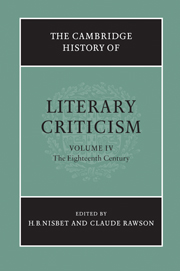Book contents
- Frontmatter
- INTRODUCTION: CRITICISM AND TRADITION
- GENRES
- LANGUAGE AND STYLE
- THEMES AND MOVEMENTS
- LITERATURE AND OTHER DISCIPLINES
- 26 Literature and philosophy
- 27 The psychology of literary creation and literary response
- 28 Taste and aesthetics
- 29 Literature and the other arts
- 30 Classical scholarship and literary criticism
- 31 Biblical scholarship and literary criticism
- 32 Science and literary criticism
- Bibliography
- Index
- References
31 - Biblical scholarship and literary criticism
from LITERATURE AND OTHER DISCIPLINES
Published online by Cambridge University Press: 28 March 2008
- Frontmatter
- INTRODUCTION: CRITICISM AND TRADITION
- GENRES
- LANGUAGE AND STYLE
- THEMES AND MOVEMENTS
- LITERATURE AND OTHER DISCIPLINES
- 26 Literature and philosophy
- 27 The psychology of literary creation and literary response
- 28 Taste and aesthetics
- 29 Literature and the other arts
- 30 Classical scholarship and literary criticism
- 31 Biblical scholarship and literary criticism
- 32 Science and literary criticism
- Bibliography
- Index
- References
Summary
It is a truism that no book was more copiously studied and written about in the late seventeenth century and throughout the eighteenth century than the Bible. The connections between biblical scholarship and literary criticism in the period are multiple and complex, the more so in that many debates about central literary theoretical questions took place within the numerous spheres of biblical discussion, rather than in works of secular literary criticism. This was inevitably the case; at the Restoration secular literary criticism in England was from some points of view in its infancy. There had been no full and systematic theory of poetry since the late sixteenth century, no extended critical analysis or scholarly edition of any English classic. The idea of a secular literary history would begin to take shape only in the eighteenth century.
I shall discuss in this essay, chiefly but not exclusively with reference to the work of British writers, two key themes: the development of appreciation and analysis of the Bible as a literary work, and of its poetic, aesthetic, and rhetorical qualities; and, at least as important to the history of literary criticism, the debates of biblical scholars about the textual and hermeneutic issues raised by the Holy Scriptures. The two themes are not unrelated.
- Type
- Chapter
- Information
- The Cambridge History of Literary Criticism , pp. 758 - 777Publisher: Cambridge University PressPrint publication year: 1997
References
- 3
- Cited by



